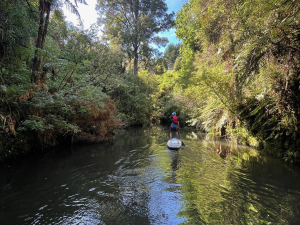DairyNZ Levy Vote Underway as Chair Highlights Seven-Fold Return
Voting has started for the renewal of DairyNZ's milksolids levy.
 Interactive resources cover the science behind riparian planting and what farmers can do to improve water quality and habitat for wildlife.
Interactive resources cover the science behind riparian planting and what farmers can do to improve water quality and habitat for wildlife.
Dairy farmers picked up practical tools and actions to enhance farm waterways at DairyNZ’s Fieldays site this year.
The Healthy Waterways exhibit gave farmers a behind-the-scenes look at how healthy farm waterways support biodiversity and farm businesses, says DairyNZ GM farm solutions and policy Dr David Burger.
Interactive resources cover the science behind riparian planting and what farmers can do to improve water quality and habitat for wildlife – including native birds, eels (tuna), freshwater crayfish (kōura) and other species.
“Water is so valuable to all of us and plays a vital role in ensuring farmers can continue running profitable and sustainable businesses,” says Burger.
Dairy farmers have made significant progress over the past 20 years to support healthy waterways, and DairyNZ wants to support other farmers to get involved too.
“That’s why we have tested the best ways to enhance water health on-farm to ensure as a sector we continue to progress a positive future for New Zealand dairy farming.”
DairyNZ water quality specialists at Fieldays, shared technical knowledge and answered questions.
Farmers learnt more about the benefits of creating shade through riparian planting, which is one of the most effective on-farm actions to create healthy waterways.
Riparian planting helps reduce runoff of nitrogen and phosphate. It also reduces the amount of sediment reaching streams and creates a great habitat for our native species to thrive including fish and insects.
On DairyNZ’s Fieldays site, levy payers went into the draw to win one of two eDNA kits – a simple way to find out what’s living in a waterway and gain an indication of its overall health.
After taking a water sample in a farm stream, farmers can check their online eDNA report to see data on the health of the waterway, including the wildlife it is supporting – such as plants, insects, fish, seafood and birds.
“Getting a picture of what wildlife is thriving and which species need more support paints a reliable picture of how healthy a waterway is and helps motivate more work to continue improving water quality,” says Burger.
Global trade has been thrown into another bout of uncertainty following the overnight ruling by US Supreme Court, striking down President Donald Trump's decision to impose additional tariffs on trading partners.
Controls on the movement of fruit and vegetables in the Auckland suburb of Mt Roskill have been lifted.
Fonterra farmer shareholders and unit holders are in line for another payment in April.
Farmers are being encouraged to take a closer look at the refrigerants running inside their on-farm systems, as international and domestic pressure continues to build on high global warming potential (GWP) 400-series refrigerants.
As expected, Fonterra has lifted its 2025-26 forecast farmgate milk price mid-point to $9.50/kgMS.
Bovonic says a return on investment study has found its automated mastitis detection technology, QuadSense, is delivering financial, labour, and animal-health benefits on New Zealand dairy farms worth an estimated $29,547 per season.

OPINION: Here w go: the election date is set for November 7 and the politicians are out of the gate…
OPINION: ECan data was released a few days ago showing Canterbury farmers have made “giant strides on environmental performance”.